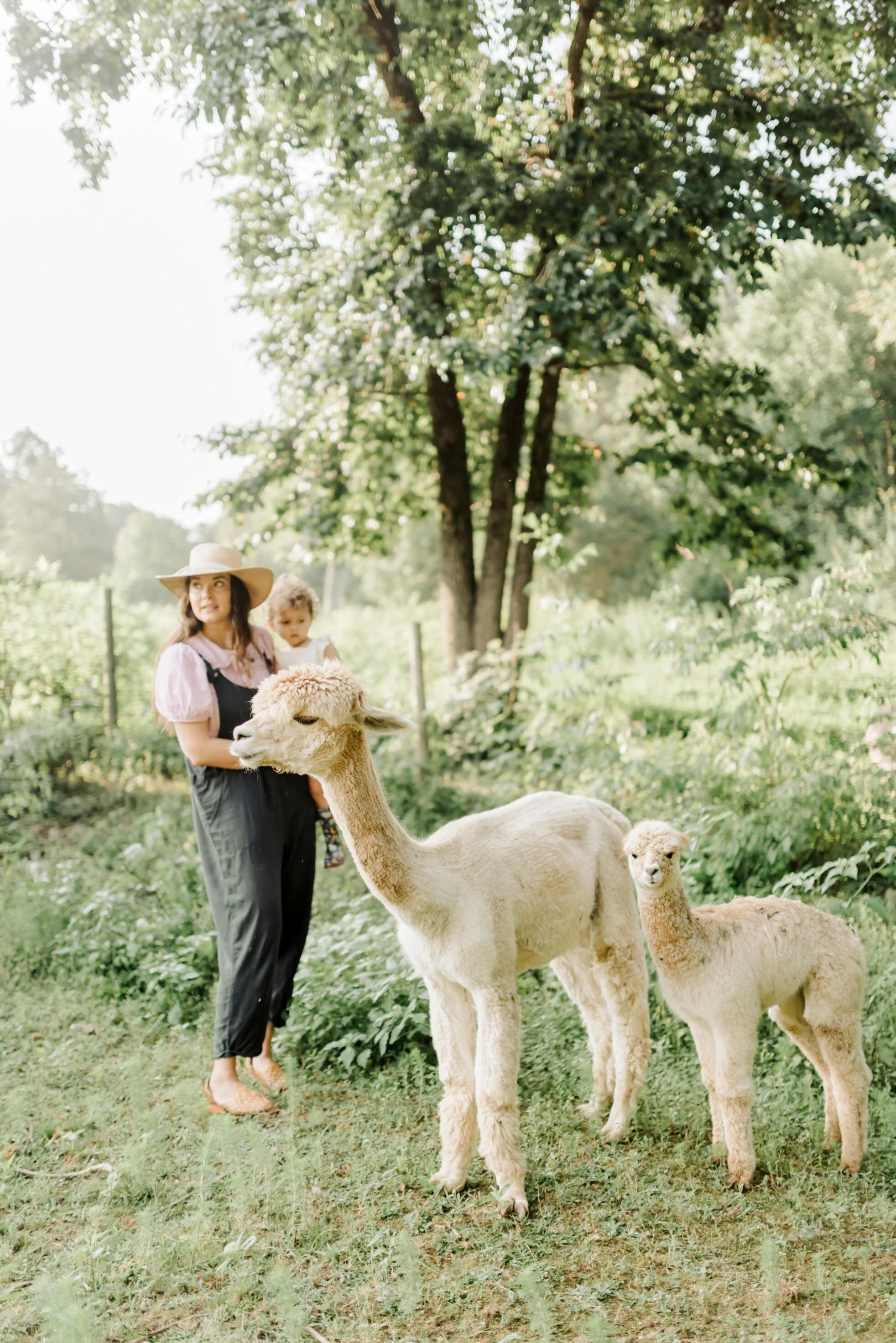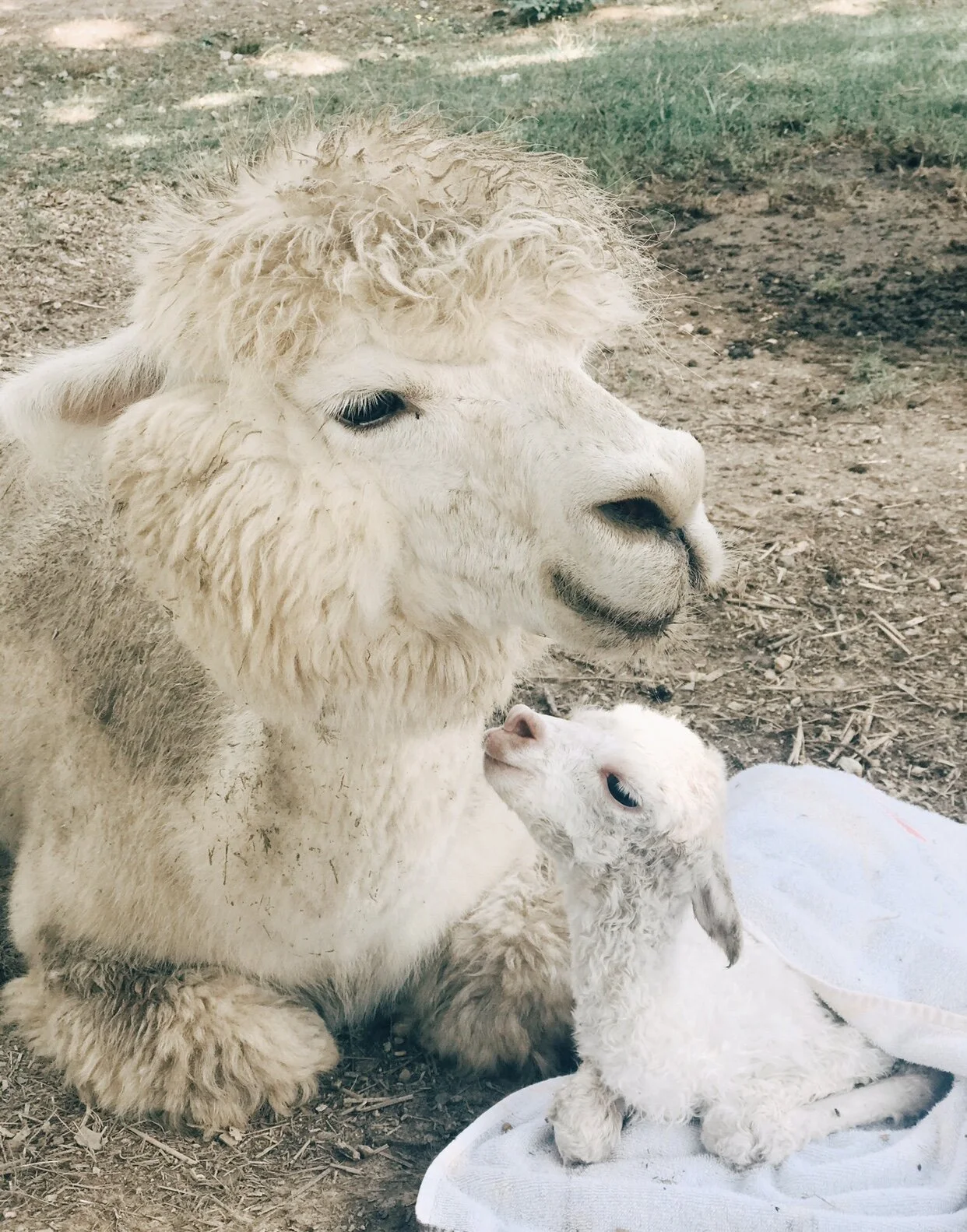Caring for Alpacas - A guide on how to raise healthy, happy alpacas
We have had alpacas on the farm for quite some time now, about four years. It wasn't too long after we moved to the farm that we couldn't resist getting these cute, fun animals! Read on for more info on how to care for alpacas.
SO YOUNG ;-)
Most of our alpacas were born here on the farm, and today we have a nice little herd, Maximus, Percy, Felix, Alpakita, and Opal.
We must admit, it probably wasn't the best idea to get alpacas as our first farm animals as they do require a bit more maintenance and care. Back then, we still had so much to learn! They were recommended to me as an easy farm animal. They are not.
But after all these years, we have learned a few tricks on caring for alpacas and I want to share with you all we have learned. I hope it will make raising alpacas a little bit easier for you!
Why Alpacas?
Mostly our reason for keeping alpacas is that they are so fun! Who doesn't want Alpacas, right?? However, they help a bit with:
Guarding against small predators.
They keep the wild grasses under control when left to graze on your pastures.
Alpaca wool is a hot commodity. Their soft wool fibers can be sold to spinners, fiber co-ops, and fiber mills to make clothes, bedding, scarves, gloves, hats, etc. I have also made some fun nesting balls for the wild birds, using our alpaca wool. See how to make them HERE.
Alpaca manure is also fantastic to enrich your soil. It is high in nitrogen, potassium, and phosphorus. We compost ours and it’s our form of fertilizer in our garden.
They keep well with other livestock.
Generally, Alpacas are very calm, just grazing about and minding their own business. Everyone gets along very well, except when it's mating season, then we have to keep an eye on the males and other farm animals, and separate them where needed.
Like all our animals, they are fun to watch and have around. We also have no problem keeping them with our donkeys and goats. They just kind of ignore each other.
Fun Alpaca Facts
Alpacas can live 15-25 years.
There are two types of alpacas; Huacayas, which make up about 80 % of the US market, and Suri.
There are no alpacas in the wild. They are exclusively domesticated.
Alpacas weigh between 110 - 200 lbs.
You can train alpacas, they are very clever.
Alpacas use a communal poop pile, so no mess all over the yard.
They will make a humming sound when they are happy, curious, nervous, or bored.
Alpacas get along just fine with sheep, donkeys, and goats but still prefer their own kind.
Alpacas spit when distressed, threatened, or to establish dominance in a group.
Alpacas have a gestation period of 242 to 345 days (gah, imagine that!). Have this ESSENTIAL DELIVERY KIT ready when one of your alpacas is about to deliver her cria.
Alpaca females can breed from 12-15 months onwards, but Alpaca males will only be able to inseminate from 30 months. I’ve waited to breed my girls until they are about 2 years old.
Caring for Alpacas
If you are considering getting alpacas, here are some tips for caring for them and having healthy, happy alpacas.
FEED & WATER
Alpacas eat about 2% of their body weight per day (on average around 2 lbs) and should ideally be pasture-fed (land covered with grass, suitable for grazing). They are pretty picky eaters and prefer nice soft grass.
Alpacas also eat roughage-rich leaves, wood, bark, and stems. Thanks to their three-chambered stomach, they digest these pretty easily, very much like cattle and sheep.
You can supplement their feed with quality long fiber grass and hay (which should make up 80% of their diet) and occasional grains or pelleted feeds. They also love the occasional treats of broccoli, carrots, apples, and turnips.
Forages should ideally have 11-13% protein. Unfortunately, many lush forages contain around 18-25% protein, which could lead to obesity.
Growing youngsters and late-term pregnant or early lactating females may need 12-16% crude protein, so supplement their diets with forage higher in protein or protein supplements.
Always provide a high-quality, loose mineral mix formulated for your type of alpacas and place it in a spot where other animals can't reach it. Alpacas should also not be able to get to other species' minerals.
If you change your alpacas' diet or they are coming from previous owners, adjust their diet gradually. The microbes in their gut need a few weeks to adapt to the new feed.
Always have fresh water available, as alpacas can quickly get dehydrated. The average alpaca downs about 4L of water per day!
Keep plenty of tanks and buckets filled with water around and clean regularly. Once again, Alpacas are finicky, so they won't eat or drink from fouled feeders and water sources.
When temperatures are below freezing, use stock tank heaters (securely mounted!) or heated-bottom buckets to keep the water unfrozen.
LIVING SPACES
Like any farm animal, alpacas need shelter to rest at night or be sheltered from bad weather. A fully enclosed pole barn with adequate ventilation is best. However, for regions with year-round warmer weather, you can get away with a 3-sided structure.
Allow at least 40-square feet of space per alpaca and provide lots of clean and dry straw for them to sleep on, especially during winter. Never use wood shaving, chips, or sand as these get stuck in their wool.
Remove any wet and soiled straw often, otherwise, you may have some serious health complications to deal with.
Ensure their barn is always well ventilated as too much moisture can lead to mold and other diseases that you want to avoid at all costs. Consider installing fans to cool them off during the summer months.
Their outdoor living spaces and where they graze should be fenced off with fencing that is at least four feet high. This will keep the alpacas from getting out and from predators getting in. It’s best to avoid barb-wired fencing, as if they try to jump, they cannot hurt themselves.
Alpacas are happiest if they have ample space to roam around, and it's good for their health! Who doesn’t like being outside, right?! I sure do! (Just keep in mind the type of forage you have to avoid endless grazing and overeating, leading to overweight and unhealthy alpacas.)
HEALTH & WELLNESS
Alpacas need at least one other alpaca for their mental and emotional well-being, preferably from the same sex. If they don’t have a partner, it can lead to severe depression, distress, abnormal interests in other species, and severe aggression directed at "intruders," including humans.
Alpha or highly territorial males may need to be corralled separately. Still, they should be within sight of other alpacas to not feel isolated.
We advise contacting your local vet to enquire about diseases and parasites present in other species within a 10-15 mile radius of your farm or ranch.
Alpacas are prone to parasites and diseases, and knowing what’s lurking around could help you to prepare for any illnesses. Your vet will also advise on general and routine care for your alpacas.
My biggest tip when it comes to alpaca health is to monitor them daily. Alpacas don’t often show obvious signs that they are unwell, and when they are sick, it can turn ugly very quickly. The earlier a problem is detected, the faster their recovery will be.
Weight loss, body score changes, pale color, listlessness, clumped stool, loss of appetite, or a runny nose and eyes, should be cause for a more detailed health assessment such as fecal analysis, veterinary exam, or blood analysis.
In addition, they should be dewormed and vaccinated with the same regime as the sheep in your local area.
Mites can also be a problem in alpacas, making them itch. You can easily spot mites thanks to the dry crusty skin they cause on the alpaca's legs, which can quickly spread across the whole body. Treat mites with a regular dog flea spray or THIS natural DIY mite spray that we like to use. Remember to treat the entire herd to prevent passing between the animals.
Due to their built-in fur coat, heat stress is something to look out for. Signs to watch for are open-mouthed breathing, nasal flaring, drooling, depressive or dull behavior, not eating, scrotal swelling (in intact males), weakness, and trembling. Their internal temperatures should range between 99.5°F to 101.5°F for adults and possibly to 103°F for newly born crias.
Have bodies of water available for them to cool off during the scorching hot summer days. I like to cool them off with a hose on the front of the neck, legs, armpits, underbelly, groin, and under the tail. They just love it!
Shearing your alpacas once a year, around April, is also a great way to prepare them for the summer months. I have a blog post explaining all about shearing your alpacas and other farm animals. READ IT HERE.
A thorough hands-on physical assessment should be done regularly, at least twice a year. This should include weighing and/or body scoring , mucous membrane color check (inner eyelid or gums), condition of incisors, and fiber coat evaluation.
It also helps to keep a record of all their info, vaccinations, deworming, etc. This helps when you need to refer back to and keep track of their health. Believe me, it's definitely helpful when your vet starts asking questions! Download my healthcare record HERE.
Friends, these are just beginner guidelines that I want to share with you. I strongly advise that you do as much research as possible, visit other alpaca farmers, and contact your local vet for an in-depth analysis of your pastures, health needs, checks, and so forth.
I hope I have inspired you the get some alpacas of your own, they truly are amazing! If you have any questions, please don’t hesitate to ask.
P.S DID YOU KNOW? I have a fun kid’s book about Percy and his adventures! Have a look HERE.
PIN FOR LATER











